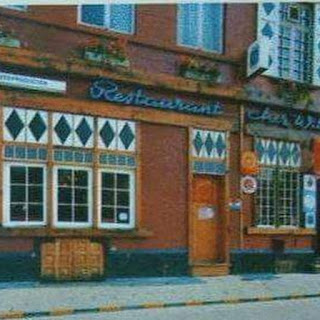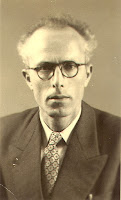When
the Paradijs vessel was being fitted out in Cuxhaven in 1980 the ship
was called Lieve, after the then girlfriend of Danny Vuylsteke.
Shortly afterwards the owners sacked Vuylsteke for a number of
reasons. But
the
name of the ship was not changed at that time. Because
Vuylsteke had been so proud
-but very
loose-tongued- about the new venture, German and Dutch police were
soon aware that a further
offshore station was being prepared in the North German port. German
police,
being
very efficient,
started to make a note of the number plates of all the cars that
parked in the neighbourhood of the Lieve. All these people were later
interrogated by the
authorities.
‘Die Polizei’ never managed to write down my number plate because
I, probably being overly careful,
always parked my car about half
a
mile away from the ship. It
kept me in shape..
I
got involved in the venture when the owners asked me to check the
rather muddled accounts.
With
the police and later Interpol
sniffing around we were aware that we really had to high-tail
it out of Germany. I went to look for a safe port. Ireland and
Portugal were pretty safe bets. Both
countries had not ratified the Council of Europe Strasbourg treaty
which was put in place to prevent or at least hinder
offshore
broadcasting.
From
our
(secret) office in Cadzand-Bad I started my search in Ireland. The
first port on my radar was Bantry
because it was probably an easy to reach harbour after rounding
Cornwall, and not too much in the limelight. So I rang the harbour
master in Bantry.
As soon as he picked up the phone I knew that Bantry
was off the list, a no go area. From the
accented
English of
the harbour master I
could tell
that he was Dutch and hence would know all about offshore stations.
It was too great a risk. So I made up an excuse and put the phone
down. A
few days later I was on my way to Ireland to find a suitable port for
our vessel. To begin with I had quite a long talk with a very helpful
harbour master in Dublin. He provided me with all sorts of
information and documentation.
 In
the meantime the Lieve had left Cuxhaven
but ran into severe weather in the Channel. In
the end the ship had to be rescued and towed to Southampton. There
was quite a bit of damage. At that time I stayed at Brian McKenzie’s.
Brian and his wife always made me very welcome. As there is no rest
for the wicked I was soon on my way to Southampton to talk to Ben
Bode who was responsible for the project. He agreed to take the ship
to Dublin and moor along the Liffey. He was especially pleased
to learn that reading
through the rules and regulations
it proved that a vessel entering the port of Dublin for
repairs as a result of
storm
damage sustained
was
exempt from paying harbour dues.
In
the meantime the Lieve had left Cuxhaven
but ran into severe weather in the Channel. In
the end the ship had to be rescued and towed to Southampton. There
was quite a bit of damage. At that time I stayed at Brian McKenzie’s.
Brian and his wife always made me very welcome. As there is no rest
for the wicked I was soon on my way to Southampton to talk to Ben
Bode who was responsible for the project. He agreed to take the ship
to Dublin and moor along the Liffey. He was especially pleased
to learn that reading
through the rules and regulations
it proved that a vessel entering the port of Dublin for
repairs as a result of
storm
damage sustained
was
exempt from paying harbour dues.
Days
later the vessel limped into Dublin and moored on
the Liffey
along
the North Wall Quay. Slowly but surely over
time the
ship was turned into an offshore radio station. Early
in 1981 studios
were installed disguised as presentation rooms in
case there was an inspection by the Customs.
The rumour we launched was that the ship was going to tour the Middle
East to familiarise the Arab countries and Israel with the newest technology:
IBM computers. To make it believable I photocopied photos of that
company’s computers together with text cut from Hebrew and Arab
newspapers and turned them into brochures. The text used had
absolutely nothing to do with IBM, not even with computers. I
didn’t have a clue what the content
was about,
but it did look quite convincing for the time. To prepare for a
possible inspection of the vessel we even had the Israeli, Turkish
and Egyptian flags on board… Later
when the equipment was delivered and the press became interested in
the ship we had to invent some different fake-news. So to keep the
real purpose of the vessel a secret as long as possible Ben explained
to the people of the press that the Magda Maria was being turned into
a research vessel.
On
April 4th
1981 the
26th
Eurovision Song contest was to be held in Dublin. Somehow we were
tipped off
that
beforehand
television
crews were going to film along the Liffey.
High time to remove the ship’s name from the vessel. Good
thing we did as the ship was clearly visible in one of the trailers
that were broadcast. Some people in Belgium and the police in The
Netherlands
would definitely have recognised the name. In
the event the United Kingdom won the contest with “Making your mind
up” performed by Bucks Fizz. For
weeks afterwards our
vessel sat along the North quay without a name. More pressing things
were at hand. Later in April I had to go to the States to organize
the transport of the transmitters and antenna equipment to Europe.
Upon
my return I really had to make haste and make
my mind up
about a new name for the ship. In
order to register the new name I made an appointment with the
Panamanian consul in Antwerp. A name change is quite a lucrative
business for the so called flag-states. So
the
consul, who told me to call him Alejandro, took me for a Chinese meal
near the Boerentoren (now KBC-tower), Europe’s first attempt at
skyscraper. I had given the new name quite a bit of thought. Since
our venture was all about ‘free’ radio, I believed that the name
of one of Latin America’s most famous freedom fighters
would be most apt. I told Alejandro that our
favourite new name
for
the
ship was
‘Simón Bolivar’, the leader who led Panama, Venezuela, and other
Latin countries to independence from the Spanish Empire. To my
surprise, Alejandro was not amused, not at all. In fact he was
furious over my suggestion. Freedom was not really their thing in
Panama. As the meal progressed I found out that Alejandro had been
head of the Panamanian secret police. When
he fell out of favour he was ‘promoted’ out of harm’s way by
his powerful military friend Manuel Noriega, the later dictator.
That’s
how he came to be in Antwerp. During
desert the consul pressed me to come up with a less controversial
name for our ship. In the end, looking
for a Belgian connection,
I suggested “Magda-Maria” the name of Swedish Radio Nord’s
former vessel, as she
spent some time in Ostend in the early sixties.
















